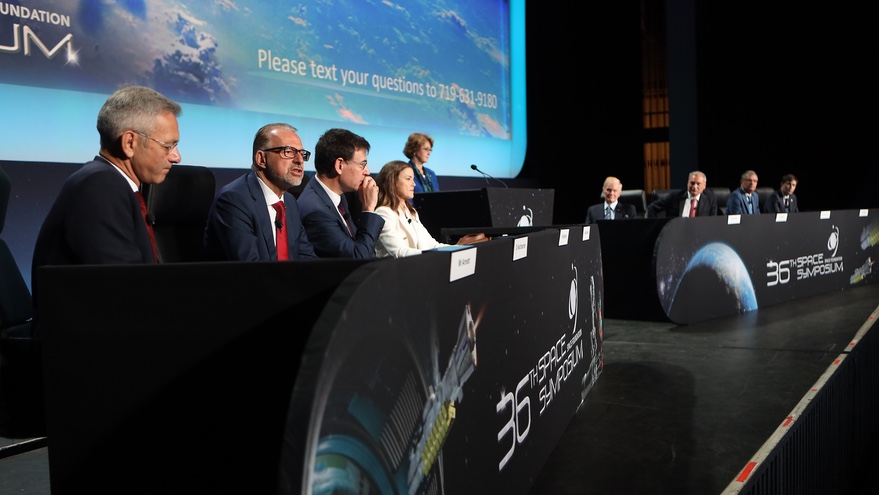COLORADO SPRINGS — Leaders of national space agencies agree that space traffic management (STM) should be a priority but have differing views on who should be responsible for it.
During a panel discussion at the 36th Space Symposium Aug. 25, the heads of space agencies in Europe and North America emphasized the importance of space traffic management given the growing amount of space objects in orbit and the threat they pose to space activities.
“Space traffic management is, from our point of view, a very important topic,” said Walther Pelzer, head of the German space agency DLR.
He argued, though, against “quick” solutions at a national level. “From a German point of view, this is not the right way,” he said. “If everyone comes up with their own ideas, is will not be sustainable.”
He supported instead an approach led by the United Nations. “To get United Nations and the word ‘speed’ into one sentence is kind of hard, and we are aware of it,” he acknowledged. “Nevertheless, we have to do space traffic management within the United Nations to have this issue sorted out sustainably.”
Later in the panel, Pelzer cited as an example the ongoing discussions about STM at the UN’s Committee on the Peaceful Uses of Outer Space (COPUOS). “I think this is the right way to discuss it, within the United Nations and the most important players, to find a common solution.”
But Josef Aschbacher, director general of the European Space Agency, said relying on the UN alone was not enough. “We need to act urgently,” he said. “We also need to find other means, because if we wait for those processes to finalize, as Walther was saying very eloquently, we cannot wait that long.”
He supported alternative approaches that could be done in parallel with the long-term UN-led approach but could be implemented sooner. “We need to find another mechanism, which is among the major players,” he said, “to really regulate and make sure our environment remains a safe place to operate our satellites.”
“We do need a strong international regulation because there will be many new actors from new countries,” said Philippe Baptiste, head of the French space agency CNES. He said the fact that current private space operators are responsible “is great” but that alone was not sufficient. He didn’t explicitly endorse an approach led by the UN or other multinational alternatives.
“Collaborating on space missions is fundamental but ensuring a strong international governance framework is equally important. It’s a priority for us,” said Lisa Campbell, president of the Canadian Space Agency. She supported development of guidelines for long-term sustainability of space at the UN but also noted Canada is one of the original signatories of the Artemis Accords, the U.S.-led effort to develop guidelines for sustainable space exploration.
NASA Administrator Bill Nelson didn’t take a stand on how STM should be developed. “Space traffic management becomes much easier if spacefaring nations will stop polluting, particularly with ASAT tests,” he said.
“I think it’s a must to have regulations that are applicable everywhere,” said Giorgio Saccoccia, president of the Italian space agency ASI. “We cannot talk about sustainability of our planet if we don’t also talk about sustainability of what is around our planet. Regulation on STM is part of that.”
